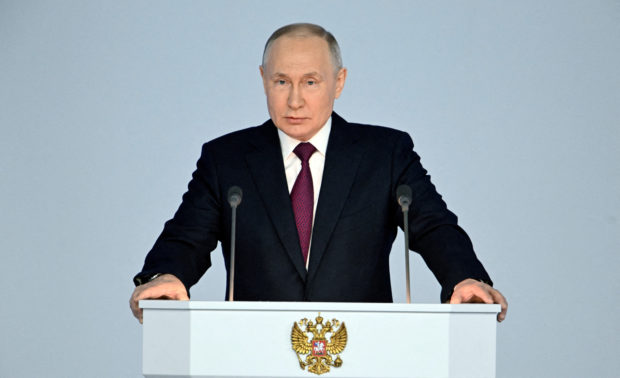
FILE PHOTO: Russian President Vladimir Putin delivers his annual address to the Federal Assembly in Moscow, Russia, on February 21, 2023. Sputnik/Pavel Bednyakov/Kremlin via REUTERS/File Photo
AMSTERDAM — The International Criminal Court (ICC) issued an arrest warrant on Friday against Russian President Vladimir Putin, accusing him of being responsible for war crimes committed in Ukraine.
Moscow has repeatedly denied accusations that its forces have committed atrocities during its one-year invasion of its neighbor.
In its first warrant for Ukraine, the ICC called for Putin’s arrest on suspicion of unlawful deportation of children and unlawful transfer of people from the territory of Ukraine to the Russian Federation.
The Kremlin said the arrest warrant against Putin was outrageous, but meaningless with respect to Russia.
READ: Kremlin: ICC warrants outrageous and unacceptable, but null and void for us
Kremlin spokesman Dmitry Peskov said Russia found the very questions raised by the ICC “outrageous and unacceptable” but noted that Russia, like many other countries, did not recognize the jurisdiction of the ICC.
“And accordingly, any decisions of this kind are null and void for the Russian Federation from the point of view of the law.”
READ: Factbox: Details of ICC arrest warrant against Putin
Asked if Putin now feared traveling to countries that recognized the ICC and might therefore try to arrest him, Peskov told reporters: “I have nothing to add on this subject. That’s all we want to say.”
Earlier this week Reuters reported that the court was expected to issue warrants.
READ: Russia, Ukraine battle for Bakhmut as ICC seeks war crime arrest warrants
Separately, the court issued a warrant for Maria Lvova-Belova, Russia’s Commissioner for Children’s Rights, on the same charges.
ICC prosecutor Karim Khan opened an investigation into possible war crimes, crimes against humanity and genocide in Ukraine a year ago. He highlighted during four trips to Ukraine that he was looking at alleged crimes against children and the targeting of civilian infrastructure.
RELATED STORIES
February 24, 2022: the day Russia invaded Ukraine
US accuses Russia of ‘crimes against humanity’ in Ukraine
War crime, crime against humanity, genocide: What’s the difference?